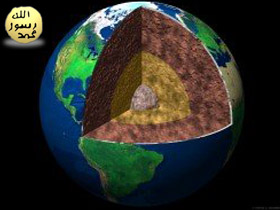One item of information about the Earth given in the Qur'an is its similarity to the seven-layered sky:
It is Allah Who created the seven heavens and of the earth the same number, the Command descending down through all of them, so that you might know that Allah has power over all things and that Allah encompasses all things in His knowledge. (Qur'an, 65:12)
The information in the above verse is confirmed in scientific sources, wherein it is explained that the Earth consists of seven strata. These, as scientists have identified, are:
1st layer: Lithosphere (water)
2nd layer: Lithosphere (land)
3rd layer: Asthenosphere
4th layer: Upper Mantle
5th layer: Inner Mantle
6th layer: Outer Core
7th layer: Inner Core
The word lithosphere is derived from the Greek word lithos, meaning stone, which is a hard stratum forming the Earth's top layer. It is quite thin in comparison to the other strata. The lithosphere under the oceans is still thinner, and is a region with volcanic activity. Its average thickness is 80 km. It is colder and harder than the other strata, and therefore, forms the earth's shell.
Below the lithosphere is the stratum known as the asthenosphere, from the Greek word for "weak," asthenes. This layer is thinner than the lithosphere and shifts. It was formed of hot, semi-solid substances capable of melting when exposed to high temperatures and pressure over geological time. It is thought that the hard lithosphere floats or moves over the slowly moving asthenosphere.23 Under these layers is a high-temperature layer some 2,900 km thick, made up of semi-solid rock known as the mantle. This contains more iron, magnesium and calcium than the crust, and is also hotter and denser, because temperature and density in the Earth increase with depth.
At the centre of the Earth is the core, approximately twice as dense as the mantle. The reason for that density is that it contains a higher proportion of metals (iron-nickel alloy) than rock. The Earth's core consists of two parts. One is the 2,200 km thick liquid outer core, the other a 1,250 km thick solid inner core. The liquid outer core provides the Earth's magnetic field as the planet rotates.
The truth of this similarity between the sky and the layers of the Earth, only identified by 20th century technology, is without doubt another of the Qur'an's scientific miracles.
23. “Inside the Earth,” http://pubs.usgs.gov/publications/text/inside.html.



